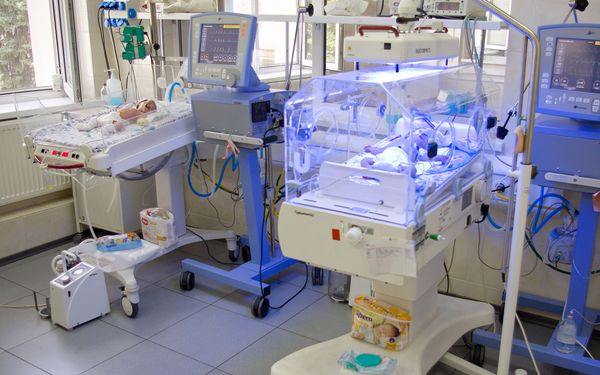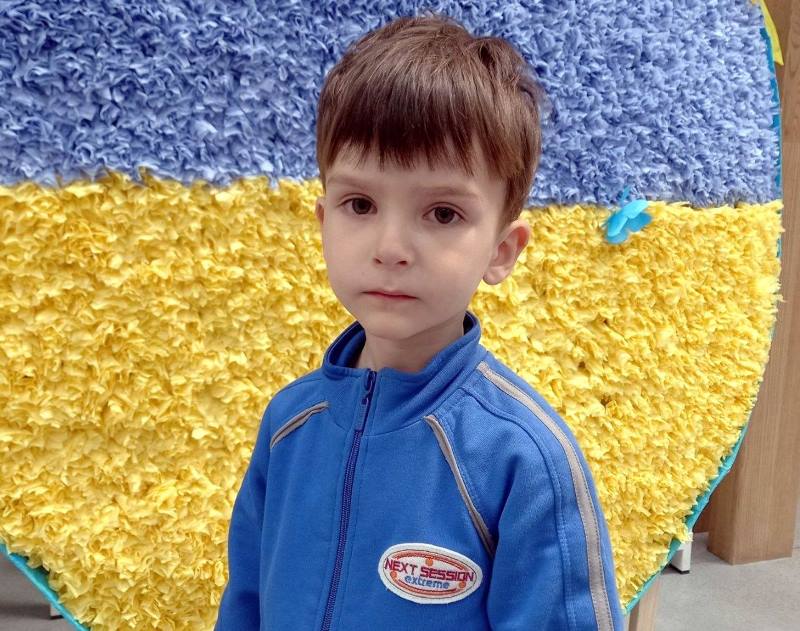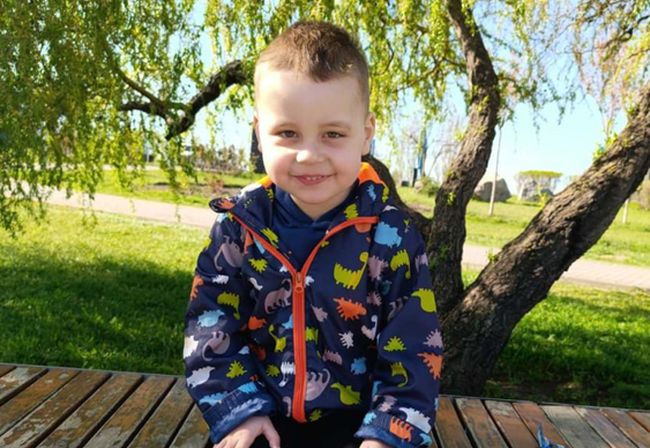Before the visit began, Beth Perrenoud was nervous.
All she knew of the two young sisters were their ages, first names and the smiling, heart-shaped faces they presented in photos.
“Do I think I can have unconditional love for them?” she wondered.
Officially, the children had come for a holiday packed with pool parties, cookouts and beach days, all organized by members of local churches.
But Perrenoud and her husband, Mike, knew the trip’s underlying goal: showcasing the children – and 18 other Ukrainian orphans – in the hope that each would be claimed for adoption.
The Perrenouds found themselves hosting two sisters: Krystyna Bratchenko, 10, and 12-year-old Tanya, who threw a monster bear-hug around Mike at a picnic for the orphans last month. “Papa!” she said.
“Eye-yi-yi!” he grunted, squeezing her in return and kissing the top of her head.
Children had always been part of the plan for the Perrenouds. But as the childless years passed, the couple, who are in their 40s, accepted that maybe parenting wasn’t in God’s plan for them.
Then, in February, their Virginia Beach church, Atlantic Shores Baptist, started His Embrace, an adoption support group. His Embrace is one of a handful of faith-based orphan-aid groups that have emerged in South Hampton Roads in the past five years.
More than 15 million children are orphaned in the world. According to UNICEF, “an enormous gap remains” between orphans’ needs and the help given so far by governments, humanitarian groups and faith-based organizations.
His Embrace treats adoption as a ministry, which answers questions about adoption, helps prospective parents understand the challenges of adoption and sponsors visits like the one that brought the children, including Krystyna and Tanya, from Ukraine to Hampton Roads last month.
There are now more than 20,000 international adoptions a year in the United States, about 2? times the number of a decade ago, according to U.S. government figures.
Adoption fits neatly with the Bible’s command to Christians, said Cindy Caravas, who attends Grace Bible Church in Virginia Beach and was a lead organizer of the Ukrainians’ visit. Caravas and her husband adopted a Russian girl in 2000.
They also have two children by birth.
“The whole Judeo-Christian faith is based on taking care of widows and orphans,” she said.
Caravas’ church, along with Atlantic Shores and others, covered the $38,000 cost of bringing the children to the area. Already they’re talking about another trip next summer.
There are no guarantees the children who visit will be adopted. The host families must first decide the fit is right. That’s what appealed to Mike Perrenoud.
“I said, 'Look, if we can find a 'try it out before we buy’ type of deal, fine,” Mike recalled. “And God said, 'OK, I hear you.’”
From the beginning, the Bratchenko sisters called the Perrenouds “mama” and “papa.”
“This is one of the features of the orphans: They call each woman 'mama,’” said Yuliya Boychun, a translator who accompanied the children from Ukraine. “They do need mamas, and they’re trying to find mama in every woman.”
They did find a “mama” in Beth the day after their arrival. Krystyna came down with strep throat, and Beth nursed the little girl on her living room sofa.
“She was that sick and didn’t have a mother; that was enough for me,” Beth said later. “I was like, 'I have to be your mother – who else is going to be?’”
Flopped down on the couch at the Perrenouds’ Great Bridge ranch home, the girls watched hours of “Snow White and the Seven Dwarfs,” “Cinderella” and other Disney classics with story lines known even in Ukraine. They raked through Beth’s costume jewelry for necklaces and bracelets and were delighted when she streaked blond highlights through their brown hair.
The girls chattered away in Russian; Mike and Beth answered back in English. Both sides improvised sign language on the spot.
An interpreter also helped the Perrenouds find out a few details of the girls’ lives. Their parents are dead, the father killed in some kind of train accident. A beloved grandmother was still alive but too old to raise them. They’d been in the orphanage for four years.
Given the girls’ hearty appetites for candy and fresh foods – each girl could tuck away four eggs at breakfast – Mike and Beth weren’t surprised when the sisters asked to visit a supermarket.
Arriving at the local Farm Fresh near the end of the first week of their visit, Krystyna and Tanya surveyed fruits, vegetables and cheeses, then stopped. Atop the store’s bakery case was a confection of Barbie in a cotillion dress rendered in cake and pink frosting. They stood transfixed.
They did not get the edible Barbie, but Mike and Beth were agreeable as the girls dropped Utz potato chips, M&Ms, Cheese Nips and doll-handled toothbrushes into the cart. Tanya did not complain when Mike limited her to a single ChapStick lip moisturizer.
“She knows what 'one’ means,” he said.
The Perrenouds had learned a little about the Ukrainian orphans before their visit from Diane Sadovnikov, an American who formerly worked as a teacher in Ukraine. Her Norfolk-based adoption agency, Sense Resource Center, worked with Caravas to bring the children, ranging from 8 to 16 years old.
It’s hard to find homes for children in that age range because most adoptive parents choose babies and younger children. To buck that trend, Sadovnikov’s agency calculatedly chose 20 poster-quality orphans most likely to tug at Americans’ hearts.
“These, of course, are the best-behaved, most adjusted children in the orphanage,” she said earlier this summer. The orphanage holds about 350 children, who live four or six to a room. The building is cold indoors in winter, and the diet is short on meat and fresh produce, she said.
But the orphanage is graced with loving caregivers, she said. However, Sadovnikov told prospective adopters, prostitution, drugs or crime are commonly the fate of orphaned children who grow to adulthood in Ukraine.
The children’s trip was not part of Ukraine’s formal process for adoption, so none of the children could be told outright about the matchmaking possibilities.
That’s part of what bothers some in the faith community about such visits. They say the children know they’re auditioning for adoption. More importantly, they say, children are inevitably disappointed – and not just those who aren’t adopted after the visits. Those who don’t make the cut to travel to America are hurt as well, said Beth Newman. She visited a Ukrainian orphanage in 2003 as part of the Loving Orphan Task Force at Kempsville Presbyterian Church.
“One child, through an interpreter, made a comment that put a knife in my heart. She said, 'Only the beautiful children get selected,’” said Newman, who has two adopted children.
“I wouldn’t do it if my life depended on it,” said Carey Dudkovsky, who started the Ukraine Children’s Fund in Chesapeake after working with a Christian humanitarian group in the former Soviet republic. “The idea is great in some sense, but it’s heartbreaking for the children” who aren’t adopted.
In Dudkovsky’s view, what Ukraine needs are schooling and job training that will help its more than 100,000 orphans become self-sufficient after they leave institutional care. Her organization is among Christian groups that send money and volunteers to support such programs.
No remedy should be excluded, said Caravas.
“They’re not all going to be adopted, but adoption is a huge part of it.”
Tanya and Krystyna were content to stay with Mike and Beth Perrenoud even as other children were shuffled among hosts in search of family chemistry. A third girl who’d been staying with the Perrenouds left for another couple after the first week, and a fourth girl joined the sisters. By this time, quiet Krystyna had firmly attached herself to Beth, while the more outgoing Tanya became daddy’s girl.
On a mild morning, Mike was sipping coffee on his poolside patio when Tanya demanded that they go for a drive.
“Papa, please!” she pleaded, arms spinning an imaginary steering wheel in the air. When he refused, the lean adolescent flounced away, returning with ice pops she brazenly shared with the family dog.
It was a moment that could test a parent’s patience, but Perrenoud watched contentedly.
“We’ve had 12 days to bond with these children, and I want them to know that they have a papa now,” he said.
“It’s not about just me and Beth anymore,” he added, as Tanya impishly stuck out a blue-stained tongue. “We’re going to go and get them, and they’re going to be part of a real family, and I think that’s what they need desperately.”
The tricky part was telling the girls they would all become a family, while observing the interdict on talking to orphans about adoption. “You can ask them, 'Would you like to come back here and live?’” and he did, Mike said. “Their mouths dropped and their eyes lit up, and they nodded their heads, 'Yes!’”
Before the girls can become part of their family, the Perrenouds still have to satisfy state, federal and Ukrainian government requirements aimed at demonstrating the couple will be responsible parents. If the process runs smoothly, Mike and Beth said, they should be in Ukraine by January to pick up the girls.
Not all of the orphans would be leaving with the same happy prospects. Of the 20 children, eight were claimed by would-be adoptive parents, and seven more were being considered by couples not quite ready to commit.
No one wanted three of the children, and one of the orphans rejected the family that wanted her.
A 16-year-old who also came on the trip was too old to adopt, but donations flowed in to sponsor his future education in Ukraine. Other contributions will help families pay for adoptions.
Caravas was pleased.
“I had to see this glass as half full, not half empty, because the positives so far, far outweigh the negatives.”
The farewells came on a Sunday morning in a noisy airport concourse in Newport News.
As the orphans awaited the flight that would start their journey home, their host parents shared tissues and blotted teary eyes. Forty suitcases packed with donated clothes each bore tags reading “Center Sense, 6 Pankivsk Street, Kiev, Ukraine.”
While the excitement of air travel brightened some orphans’ faces, others were glum and tearful, including Tanya and Krystyna.
Sobbing, the girls sheltered under Beth’s arms on an airport bench. When Mike dropped to his knees, Tanya hugged him fiercely.
Krystyna, in turn, accepted his embrace stiffly – but for a moment only. Fat tears on her cheeks, the little girl buried her face in his shoulder and trembled as he offered reassurance.
“Papa fix,” he said.
Reach Steven G. Vegh at (757) 446-2417 or steven.vegh [at] pilotonline.com



